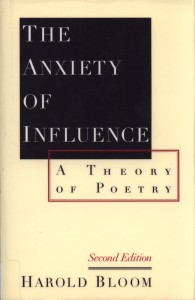
Regarding Michael Sinding’s earlier post on Frye and the Curriculum, Jonathan Allan makes this interesting observation:
Another aspect of this discussion, perhaps, is the place of Frye’s early “disciples” or critics deeply influenced by Frye. Fredric Jameson in his recent book, Archaeologies of the Future, reluctantly admits the importance of Frye: “Any reflection on genre today owes a debt — sometimes an unwilling one — to Northrop Frye’s Anatomy of Criticism” (257 n.3). The other central example being Harold Bloom whose anxiety of influence seems to have completely taken him over (something Frye noticed already in the late 70s). In his introduction to the latest Princeton edition of the Anatomy, Bloom writes: “I am not so fond of the Anatomy now, as I was more than forty years ago, but I probably absorbed it in ways I can no longer apprehend” (in Anatomy vii). In 2009, in the Hopkins Review, he writes: “Now, at seventy-eight, I would not have the patience to read anything by Frye” (27). Thus, a query that seems to be part of this is why these critics have left Frye behind or distanced their work from Frye’s work.

We’ve been lucky enough to be exposed to a lot of Wilde today. Here’s a quote that’s been attributed to him: “Every great man has disciples, but it’s always Judas who writes the biography.”
In January 1969 Harold Bloom wrote to Frye to tell him about his developing theory of the anxiety of influence. Frye replied, “You don’t say much about the general direction or scope of your book. If you mean influence in the more literal sense of the transmission of thought and imagery and the like from earlier poet to later one, I should think that this was simply something that happens, and might be a source either of anxiety or of release from it, depending on circumstances and temperament. But of course it is true that a great poet’s maturity brings with it a growing sense of isolation, of the kind one feels in Yeats’ Last Poems, Stevens’ The Rock, and perhaps even Blake’s Job series. I should very much like to hear more about the book and about your progress with it” (letter of 23 January 1969). In his Foreword to the fifteenth printing of Anatomy of Criticism, Bloom picks up part of what Frye had written thirty one years before: “Frye disliked the idea of an anxiety of influence, and told me that whether a later writer experienced such an affect was due entirely to temperament and circumstance” (vii).
There is, of course, a difference between “might be a source either of anxiety or a release from it” and “was due entirely.” It might be that the real anxiety of influence was Bloom’s anxiety about Frye’s influence. What Jonathan Allan calls “distancing” could well be and example of the killing off of the critical father. Frye, at any rate, thought so. Some years later he wrote to Morton D. Paley, “I hope it isn’t too arrogant for me to think that I represent Bloom’s chief anxiety of influence (letter of 17 January 1978).
To the discussion about Bloom and Jameson from Jonathan Allan, Russell Perkin, and others, I’d add that since Bloom is at least as out as Frye, I don’t know how much Bloom’s distancing from Frye counts in Frye’s distance from the current scene. (Being irrelevant to Bloom is kind of a double-negative, like Don Quixote saying everyone ELSE is deluded.) Not that I have much to back this up with, but my sense is that Bloom’s theory was never really in, didn’t change the landscape, at least not as Frye did. Maybe he’s suffering the anxiety of his own lack-of-influence. I’m not sure if this disagrees with Russell’s note. A book may be indispensable for specialists without being greatly influential in terms of big pictures and long runs.
On this note, I have to wonder, why was Bloom chosen to introduce the Anatomy? Why not someone like Hayden White, who’s pretty clear about Frye’s value, not so self-regarding, and still relevant himself?
On another note, the Jameson connection is also important. But can we call him an early disciple? I didn’t get that impression from The Political Unconscious, where he’s already distant from Frye. But I don’t know much about Jameson outside of that. His argument in PU is intriguingly baroque—the systems of Frye and Propp and Greimas are all spun so that again, eureka, ‘everything fits together’ in the dialectic. Jameson’s criticism of Frye there is interesting, and might be worth getting into at some point, for itself, and as an indicator of attitudes to Frye. I’d be curious to know if there are different reasons for distancing in Jameson’s utopia book.